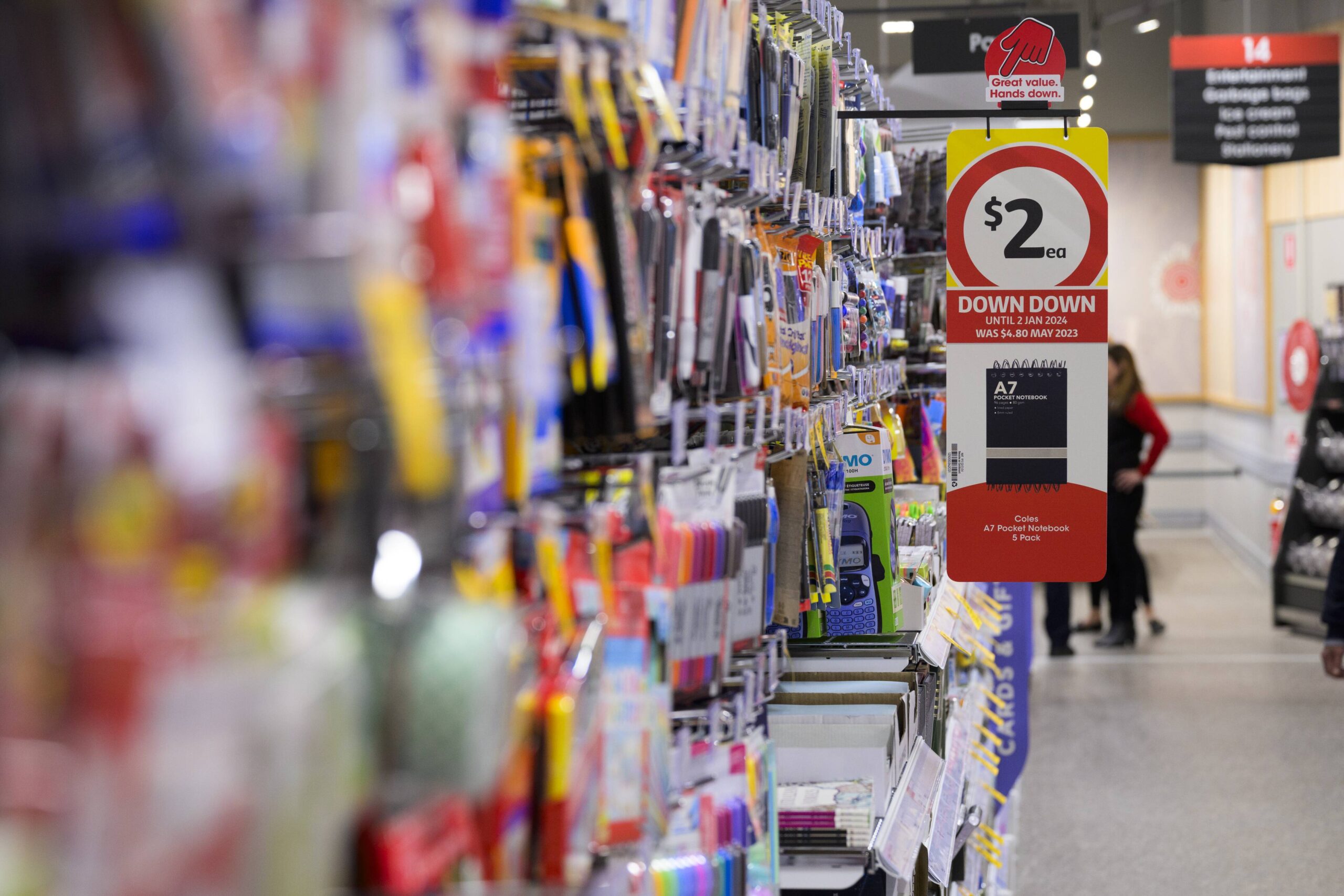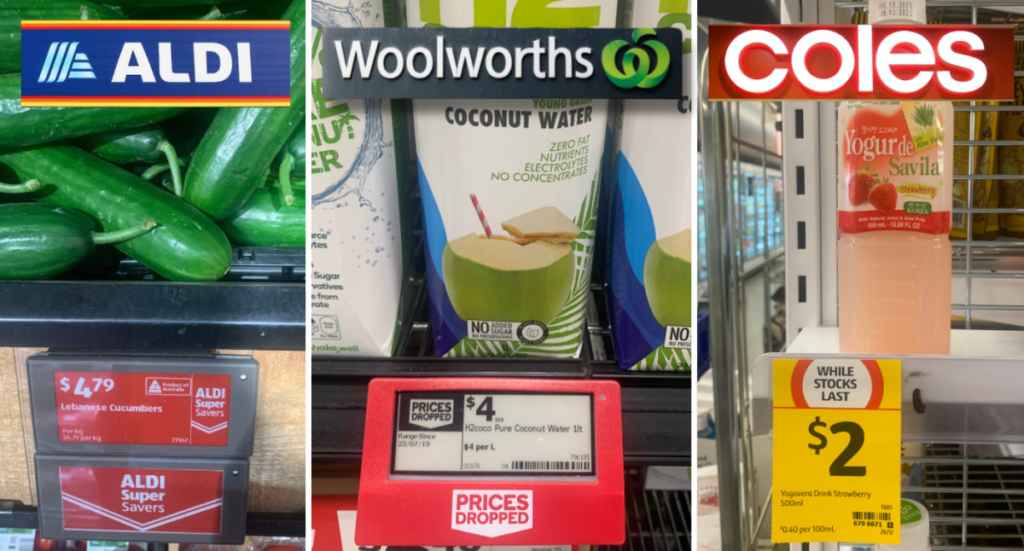Misleading Promotions Alleged
The ACCC has accused Coles and Woolworths of misleading consumers with “Down Down” and “Price Dropped” labels.
Inflated Prices Claimed
The watchdog claims both supermarkets increased product prices by up to 15% while maintaining the same purchase prices for months.
Consumer Law Violations
The ACCC alleges both chains engaged in unconscionable conduct and could face penalties of up to $50 million per breach.
New Code of Conduct for Groceries
A government-drafted code aims to regulate the grocery supply chain and improve conduct in the food sector.
Supermarkets Respond
Woolworths and Coles have responded to the allegations, pledging to review claims and balance cost inflation with value.
The Australian Competition and Consumer Commission has launched fresh legal action against two of the country’s biggest supermarkets, accusing them of misleading consumers. People are used to seeing the “Down Down” and “Price Dropped” labels on products, but the watchdog claims the supermarkets are deceiving the public.
The ACCC commenced legal action against Coles and Woolworths on Monday, accusing them of breaching Australian consumer law. The watchdog claimed that the two companies had allegedly inflated the prices of various products by up to 15 percent. It also noted that the purchase prices of these goods remained the same for several months.

The ACCC claimed that the two companies’ marketing campaigns had deceived the public into believing that the regular prices of their products were lower than they actually were. Gina Cass-Gottlieb, the watchdog’s chair, said that these promotions were linked to the continuous reduction of the prices of various supermarket products.
According to the ACCC, the regular prices of these products were higher than the promotions’ prices. It also claimed that both Woolworths and Coles had violated the consumer law by making false and misleading claims about the discounts.
In many cases, the ACCC claims that both Coles and Woolworths were aware of the plans to place the products under price promotions known as “Prices Dropped” or “Down Down.” These temporary price spikes were then implemented to establish a higher “was” price. The watchdog claims that, in total, 266 products were mispriced by Woolworths over the course of two and a half years.
It was estimated that the two supermarkets were able to sell millions of these products. They also gained a significant amount of revenue from these sales.
The ACCC has accused the supermarkets of engaging in unconscionable conduct and has asked the court to compel them to appear before it.
Each breach of the consumer law can lead to a maximum penalty of $50 million. The court can also determine the amount of benefit that the breaches of the law provided. If the court can’t reach a verdict on the value of the benefit that the supermarkets allegedly gained, then it can consider reducing the penalty to 30 percent of the company’s adjusted turnover.
During a press conference, the ACCC’s chairman said that the excessive prices of these goods and services have an inflationary impact. He noted that the Reserve Bank of Australia is currently focused on keeping the inflation rate at around 2 percent to 3 percent.
He noted that the ACCC’s actions would help the Reserve Bank of Australia keep the inflation rate at a low level. He also said that it was unacceptable for the two supermarkets to engage in unconscionable conduct. He said that customers shouldn’t be treated as fools by the retailers.
On the same day that the ACCC announced the court proceedings against the two supermarkets, the government released a draft for a code of conduct that would be aimed at improving the conduct of the food and grocery sector.
The draft was developed following a review conducted by Craig Emerson, a former Labor minister. He noted that since the current code of conduct doesn’t have penalties, no disputes have been resolved since 2021. The new code will be mandatory for businesses with annual revenue of more than $5 billion. It will be tasked with regulating the grocery supply chain to ensure that there are clear standards.
Emerson noted that the new code would require the supermarkets to treat their suppliers with dignity and respect. He said that they would no longer be able to use their dominant bargaining power over their smaller suppliers. As a result, the major supermarkets such as Aldi and Woolworths will be facing significant penalties once the code is fully implemented.
The government also announced that it would provide enhanced protections for whistleblowers to ensure that they can speak out about abusive practices. According to Albanese, the government is committed to ensuring that Australian families get a fair go. He noted that families are suffering because of the actions of the ACCC. In response to the allegations made by the ACCC, Woolworths said that it would carefully review the claims made by the agency.
Amanda Bardwell, the new CEO of the supermarket chain, said that the company’s new program was designed to provide its customers with great value.
She noted that Australians continue to face cost-of-living issues, which is a major concern for many families.
According to her, customers are demanding that the supermarket chains deliver more value. She noted that the company is committed to doing everything in its power to provide its customers with the best possible experience.
The ACCC’s allegations revolved around a period of time when Coles was allegedly being affected by significant cost inflation. The company noted that its own expenses were also rising, which resulted in an increase in the prices of many of its products.
In response, Coles noted that it was trying to strike a balance between maintaining the prices of its products while also offering customers value. It was able to do this by recommencing its promotional activities following the introduction of the non-promotional price. A survey conducted by CHOICE revealed that many Australians were not clear on what savings labels meant.
The survey also revealed that many consumers were not able to quickly determine if a product was advertised as having a “prices dropped” label or not. For instance, it was found that H20 Coconut Water was reduced from $6.50 to $4 in 2019, yet it still had a price labeled as “prices dropped.”

